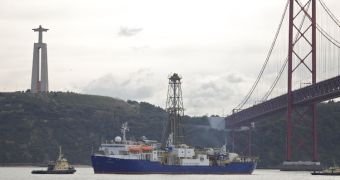Scientists who participated in the Integrated Ocean Drilling Program (IODP) Expedition 339: Mediterranean Outflow say that the investigation was able to reveal important clues related to Earth's climate history. The necessary data were derived from samples collected in the Mediterranean Sea.
The IODP initiative was developed precisely for these types of studies. Expeditions are usually carried out aboard the research vessel JOIDES Resolution. The boat is equipped to retrieve rock samples from the bottom of the ocean or, in this case, the Mediterranean Sea.
Bottom currents in this particular area of the world lay down sediment deposits that code a lot of information about conditions present on Earth at that time. In addition, this particular sea has a very interesting geographical disposition, which makes it very important from several perspectives.
First and foremost, it communicates with the Atlantic Ocean through just one, narrow strait. It is also connected to the Black Sea through two straits, and the circulation patterns that develop between these bodies of water produces some interesting sedimentation patterns.
Scientists conducted the research off the southwest coast of Iberia and the nearby Gulf of Cadiz. A total of 35 investigators from 14 countries were involved in collecting the core samples. The research expedition, the first of its kind to be conducted in this area, lasted for 8 weeks.
The vast majority of samples the team collected were made up of a sediment that closely follows the contours of the ocean basin, and is therefore called contourite, the US National Science Foundation (NSF) reports in a press release.
“The recovery of nearly four kilometers of contourite sediments deposited from deep underwater currents presents a superb opportunity to understand water flow from the Mediterranean Sea to the Atlantic Ocean,” explains Jamie Allan.
The expert holds an appointment as a program director with the NSF. The Foundation contributes extensively to funding the IODP. “Knowledge of this water flow is important for understanding Earth's climate history in the last five million years,” Allan says.
Researchers with the team will now return to the lab, in order to analyze the samples they've collected more in-depth. Over the next couple of years, we can expect to see several studies published based on these observations.

 14 DAY TRIAL //
14 DAY TRIAL //